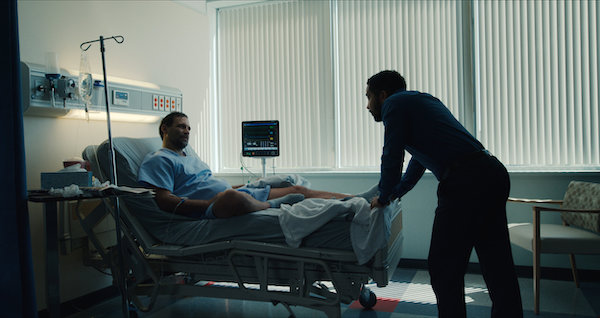Film Review: “Last Night in Rozzie” — Troubled Youth, Forgotten Truth
By Peg Aloi
There’s a powerful sense of place built into Last Night in Rozzie: the direction and acting evoke the feeling that inevitably comes when we return to our childhood neighborhood.

A scene from Last Night in Rozzie.
Directed by Sean Gannet (Chasing Taste), written by Boston local Ryan McDonough, Last Night in Rozzie (featured in this year’s Independent Film Festival Boston on May 15) follows a New York lawyer who is haunted by a traumatic occurrence in his youth. Ronnie Russo (Insecure’s Neil Brown Jr.) receives a phone call from his childhood best friend, Joey Donovan, who tells him he is dying. Ronnie drops everything and drives to Roslindale, first making a stop at Faulkner Hospital to see Joey (veteran TV actor Jeremy Sisto in an earthy, subtle performance). Ronnie begins to recall fragments of what happened on a long ago night, just before he moved away from the neighborhood. The memory is fuzzy, but it’s obvious something awful happened, and that this was the last time he ever saw Joey.
Seeing his old friend in his hospital bed, coughing violently, leaves Ronnie upset and unbalanced. But Joey, resigned to his fate, jokes with his old friend as if no time has passed. Joey admits he has screwed up; it’s clear his illness is the result of too many years of hard drinking. He tells Ronnie he got married to Ronnie’s old crush Pattie, and that she won’t let him see their ten year old son. Joey asks for Ronnie’s help in setting up a meeting.
The long-estranged friends pick up nearly where they left off, and Joey’s terminal diagnosis makes each moment seem urgent. Ronnie feels that he should do what Joey asks. But there is an uneasiness between them: pain that remains unacknowledged, secrets long buried. As the film unfolds, we are given more of the back story, and what took place on that terrible night. Cinematographer Matt Suter creates an effective visual language for the troubling memories that Ronnie is struggling to grasp. He visits Pattie (played by Australian actress Nicky Whelan), and tells her he’s in town visiting his mother. At first she pretends not to remember him, and then teases him that he left her anonymous notes when they were teenagers. There is still some chemistry between them, but it’s complicated by their connection to Joey. And then there are those hidden secrets.
Ronnie also harbors complicated feelings about his mother Margaret, who he surprises with a visit. She’s glad to see him, but there are unresolved issues there as well, mostly about Ronnie’s father, whom he never met. Character actress Maureen Kieller is effective in this pivotal role, which sheds light on Ronnie’s difficult childhood. The screenplay probably includes one too many dramatic conflicts to be plausibly resolved in a short time. But when the dramatic climax arrives it offers a shocking twist that raises the stakes considerably. I also found that expository dialogue substitutes at times for action, though the excellent cast transcends this effectively. More scenes of the boys’ youth would have been welcome: their young counterparts were well-played by Greyson Cage and Ryan Canala (as Ronnie and Joey, respectively). Admirably, the cast members get their Boston accents just right, and that is no small feat. (It is a constant point of contention among Boston film audiences). Sisto in particular captures Joey’s hard edges and easy humor.
There’s a powerful sense of place built into this film: the direction and acting evoke the feeling that inevitably comes when we return to our childhood neighborhood. Everything is different yet it all still seems unchanged somehow. Ronnie’s inability to reconcile with past events explains why he has stayed away so long. Yet, as he drives around the neighborhood, we sense how deeply Rozzie has seeped into his bones. The psychological damage that haunts the protagonist is too heavy to heal in a couple of days. Still, Last Night in Rozzie ends powerfully, as Ronnie comes to terms with painful regrets and moves forward by facing his demons.
Peg Aloi is a former film critic for the Boston Phoenix and member of the Boston Society of Film Critics. She taught film studies in Boston for over a decade. She writes on film, TV, and culture for web publications like Vice, Polygon, Bustle, Mic, Orlando Weekly, Crooked Marquee, and Bloody Disgusting. Her blog “The Witching Hour” can be found at themediawitch.com.
